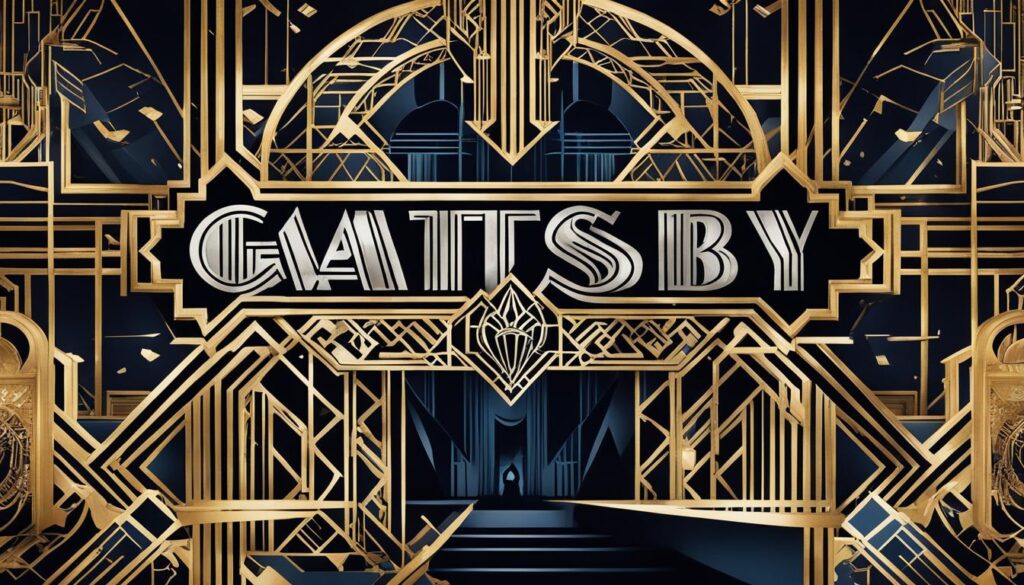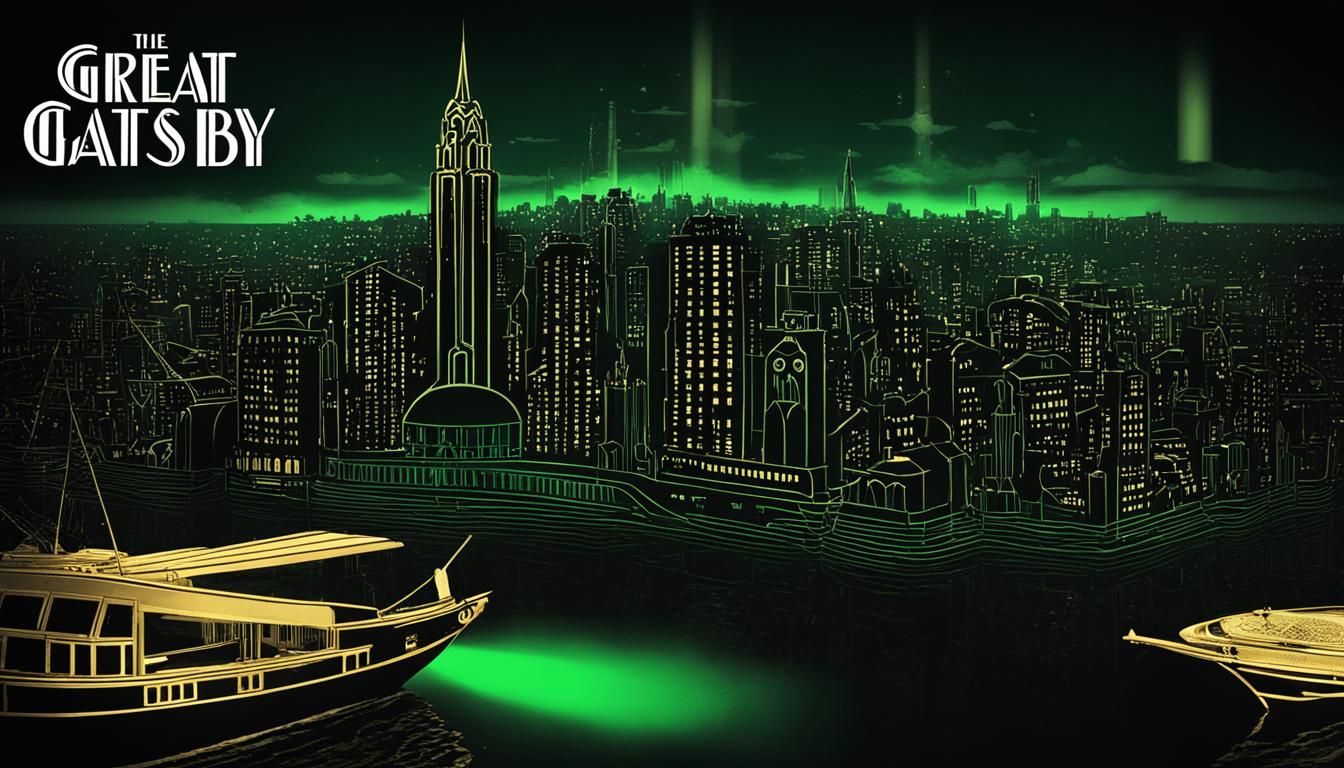If you’re a fan of classic literature and are in search of a captivating audiobook, then look no further than “The Great Gatsby” by F. Scott Fitzgerald. This audiobook review delves into why “The Great Gatsby” is a must-listen for literature lovers and audiobook enthusiasts alike.
In this article, we’ll provide a detailed overview of this timeless classic, including its plot summary, characters analysis, setting, themes, and writing style. Furthermore, we’ll explore the audiobook narration, visual imagery, and sound effects in this adaptation. By the end of this audiobook review, you’ll discover why “The Great Gatsby” is a masterpiece that stands the test of time, and why its audiobook rendition is a fantastic way to experience it.
So, let’s dive into this review and find out why “The Great Gatsby” is a must-listen for lovers of classic literature and beyond.
About “The Great Gatsby”
Published in 1925, “The Great Gatsby” is a novel by American author F. Scott Fitzgerald. The book is set in the roaring 1920s, post World War I, a time of great social, cultural, and political change. The novel has been hailed as a masterpiece of American literature and is widely regarded as a classic of the modernist movement.
F. Scott Fitzgerald was an American writer known for his novels and short stories. He was a leading figure in the American literary scene during the 1920s known as the Jazz Age. Fitzgerald’s works often explore themes of wealth, love, and the disillusionment of the American Dream.
“The Great Gatsby” depicts the lavish and extravagant lifestyles of the wealthy elite, set against a backdrop of corruption, deceit, and tragedy. The novel has been celebrated for its insight into the American psyche and its portrayal of the excesses and moral decay of the time.
Plot Overview
Set in the Roaring Twenties, “The Great Gatsby” by F. Scott Fitzgerald tells the story of Jay Gatsby, a wealthy man who throws extravagant parties in hopes of attracting his lost love, Daisy Buchanan. Narrated by Nick Carraway, the novel explores themes of love, wealth, and social class through the lens of the characters. As the story unfolds, the tension between Gatsby and Tom Buchanan, Daisy’s husband, reaches a boiling point, leading to a tragic ending that leaves readers questioning the true nature of the American Dream.
Setting and Atmosphere
Immerse yourself in the lavish world of the Jazz Age with “The Great Gatsby” setting. F. Scott Fitzgerald paints a vibrant picture of opulence and excess, transporting readers to the glittering mansions of Long Island and the bustling streets of New York City.
The luxurious and decadent party scenes showcased in the novel immerse readers in the roaring twenties, capturing the essence of the Jazz Age with lively music, flowing champagne, and extravagant fashion. The setting of “The Great Gatsby” is not just a backdrop but an intricate part of the story, highlighting the stark contrast between the old world aristocracy and the new money elite.
Through vivid descriptions, Fitzgerald creates a visual and sensory masterpiece that transports readers to another time and place, immersing them in the glamour and excess of the era. The setting serves to intensify the themes of love, deception, and the pursuit of the elusive American Dream, making it a truly memorable reading experience.
Characters Analysis
One of the distinguishing features of “The Great Gatsby” is its array of complex and multifaceted characters, each with their own motivations and roles within the story.
Jay Gatsby
As the titular character, Jay Gatsby is shrouded in mystery and enigma, with a past veiled in secrecy and speculation. Through Nick Carraway’s narration, we learn about Gatsby’s humble beginnings and his unyielding pursuit of wealth and status, all driven by his love for Daisy Buchanan. Despite his wealth and glamour, Gatsby ultimately proves to be a tragic figure, undone by the corrupt and hollow pursuits of the Jazz Age.
Daisy Buchanan
Daisy Buchanan, the object of Gatsby’s affections, is a complex character whose motivations and loyalties are murky at best. Through her actions and words, we see glimpses of her frivolous and vain nature, as well as her inner conflicts and anxieties. While she may seem to embody the glamour and prestige of the Roaring Twenties, Daisy ultimately emerges as a casualty of its excesses.
Nick Carraway
The narrator and observer of the events within the story, Nick Carraway provides a grounded and introspective perspective amidst the chaos and emotional turmoil of the other characters. As the story unfolds, we see Nick struggling with his own moral compass and grappling with the consequences of his relationships with the other characters.
Other Characters
Aside from these main characters, “The Great Gatsby” features a range of supporting characters who each contribute to the overall themes and atmosphere of the story. These include Tom and Myrtle Buchanan, Jordan Baker, and various minor characters who represent different facets of the Jazz Age and its impact on society.
Themes Explored
As one of the most celebrated works of F. Scott Fitzgerald, “The Great Gatsby” explores a range of complex themes that continue to resonate with readers today. The novel’s themes of passion, deceit, and the American Dream are particularly noteworthy and lend themselves well to exploration.

| Theme | Description |
|---|---|
| Passion | The theme of passion is prevalent throughout the novel, particularly in the context of romantic love. The characters’ intense feelings of passion drive the plot, leading to both triumphs and tragedies. |
| Deceit | Deception is another central theme in “The Great Gatsby.” The characters’ ability to deceive others, as well as their own self-deception, fuels the novel’s conflicts and fuels the overall narrative tension. |
| American Dream | The elusive American Dream is another significant theme in “The Great Gatsby.” This theme is woven throughout the novel, as characters strive towards achieving success, wealth, and status. However, Fitzgerald’s exploration of the theme suggests that the American Dream is ultimately unattainable and even destructive. |
By examining these themes, readers can gain a deeper understanding of the characters and events in “The Great Gatsby,” as well as engage in critical analysis of the novel’s overarching messages.
Writing Style and Language
F. Scott Fitzgerald’s writing style is a signature blend of poetic, descriptive prose with a sharp focus on detail. His use of symbolism and metaphors creates a nuanced, layered narrative that requires close reading and interpretation.
The language in “The Great Gatsby” is refined and sophisticated, reflecting the upper-class society of the characters. Fitzgerald’s mastery of language conveys the opulence and excess of the Jazz Age while also highlighting the flaws and emptiness of the characters’ pursuits.
Prose and Narrative Techniques
Fitzgerald’s prose is characterized by its dreamlike quality and timeless elegance. He uses repetition, metaphors, and synecdoche to create an atmosphere of nostalgia and longing. The narrative techniques employed in “The Great Gatsby” exemplify Fitzgerald’s skillful storytelling, with the use of flashbacks, dramatic irony, and unreliable narration.
The Stream of Consciousness
Another technique utilized by Fitzgerald is the stream of consciousness, which provides insight into the minds of the characters and their innermost thoughts and desires. This technique allows for a deeper exploration of character motivation and adds to the complexity of the narrative.
| Fitzgerald’s Writing Style | The Language of “The Great Gatsby” |
|---|---|
| Poetic, descriptive prose | Reflects upper-class society |
| Symbolism and metaphor | Conveys opulence and excess |
| Repetition and synecdoche | Highlights the flaws of pursuit |
Fitzgerald’s writing style and language in “The Great Gatsby” are integral to the novel’s lasting impact on readers and its position as a classic of American literature.
Audiobook Narration
When it comes to audiobooks, narration can make all the difference in a listener’s experience. In the case of “The Great Gatsby” audiobook, the narration by Jake Gyllenhaal is a standout feature. Gyllenhaal’s voice acting brings each character to life, with distinct voices and accents that add depth to the story.
The pacing of the narration is also well-done, with Gyllenhaal’s delivery matching the tone and atmosphere of each scene. The overall listening experience is engaging and immersive, making it easy to get lost in the world of 1920s high society.
The Great Gatsby Audiobook Narration Table
| Aspect | Review |
|---|---|
| Voice acting | Excellent, with distinct voices for each character |
| Pacing | Well-done, matches the tone of each scene |
| Listening experience | Engaging and immersive, makes it easy to get lost in the story |
In conclusion, the narration in “The Great Gatsby” audiobook is a definite highlight, with Jake Gyllenhaal’s voice acting, pacing, and overall delivery elevating the listening experience. Any fan of the novel or those interested in 1920s culture would enjoy this audiobook adaptation.
Visual Imagery and Sound Effects
The audiobook adaptation of “The Great Gatsby” takes storytelling to new heights through the use of expertly crafted visual imagery and sound effects. The vivid descriptions of opulent mansions, lavish parties, and the glistening lights of New York City are brought to life through the use of carefully selected and precisely timed sound effects. From the clinking of glasses to the sound of car engines roaring down the street, the auditory experience adds depth and realism to the story, transporting the listener into the world of the Jazz Age.
Moreover, the captivating narration and engaging use of voice acting immerses the listener in the world of “The Great Gatsby.” The narrator’s crisp and clear voice brings to life the richly detailed characters with ease and precision. Furthermore, the seamless transition between the narrator’s voice and the character’s actual dialogue is masterfully done, making for an engaging and captivating listening experience.
Audiobook Experience and Recommendation
The audiobook experience of “The Great Gatsby” provides a captivating and immersive listening journey that transports listeners into the opulent world of the Jazz Age. The combination of F. Scott Fitzgerald’s masterful storytelling and the skilled narration by Jake Gyllenhaal creates an audio adaptation that captures the essence and depth of the novel.
Throughout the audiobook, Gyllenhaal’s voice acting remains consistent and engaging, effectively conveying the emotions and nuances of each character. The pacing and tone of his narration are well-suited to the story’s themes, capturing the passion and deceit that underlie “The Great Gatsby.”
Furthermore, the use of sound effects and visual imagery in the audiobook enhances the listening experience, adding an extra layer of depth and sensory immersion. The sound of champagne glasses clinking and partygoers’ murmurs adds an extra dimension to the auditory experience, while the vivid descriptions of opulent parties and the luxurious setting come to life in listeners’ minds.
Overall, “The Great Gatsby” audiobook provides a compelling and enriching listening experience that is sure to captivate fans of the novel and newcomers alike. As a recommendation, we highly suggest listeners to experience the audiobook adaptation of “The Great Gatsby” for its engaging narration, use of sound effects and visual imagery, and ability to evoke the glamour and poignancy of Fitzgerald’s classic tale.
Conclusion
Overall, the audiobook adaptation of “The Great Gatsby” is a fantastic option for fans of the novel and those new to the story. The narration by [insert narrator name] is engaging and captures the essence of each character, while the use of sound effects and visual imagery adds depth to the listening experience.
F. Scott Fitzgerald’s writing style and the themes explored in “The Great Gatsby” are brought to life through the audiobook, making it a worthwhile addition to any literary collection. The audiobook’s pacing and overall production quality make it a highly enjoyable and immersive experience for listeners.
Whether you’re a fan of the book or simply looking for a new audiobook to enjoy, “The Great Gatsby” audiobook comes highly recommended.
In conclusion, the audiobook adaptation of “The Great Gatsby” is a must-listen for those seeking a captivating and well-produced audiobook experience.
